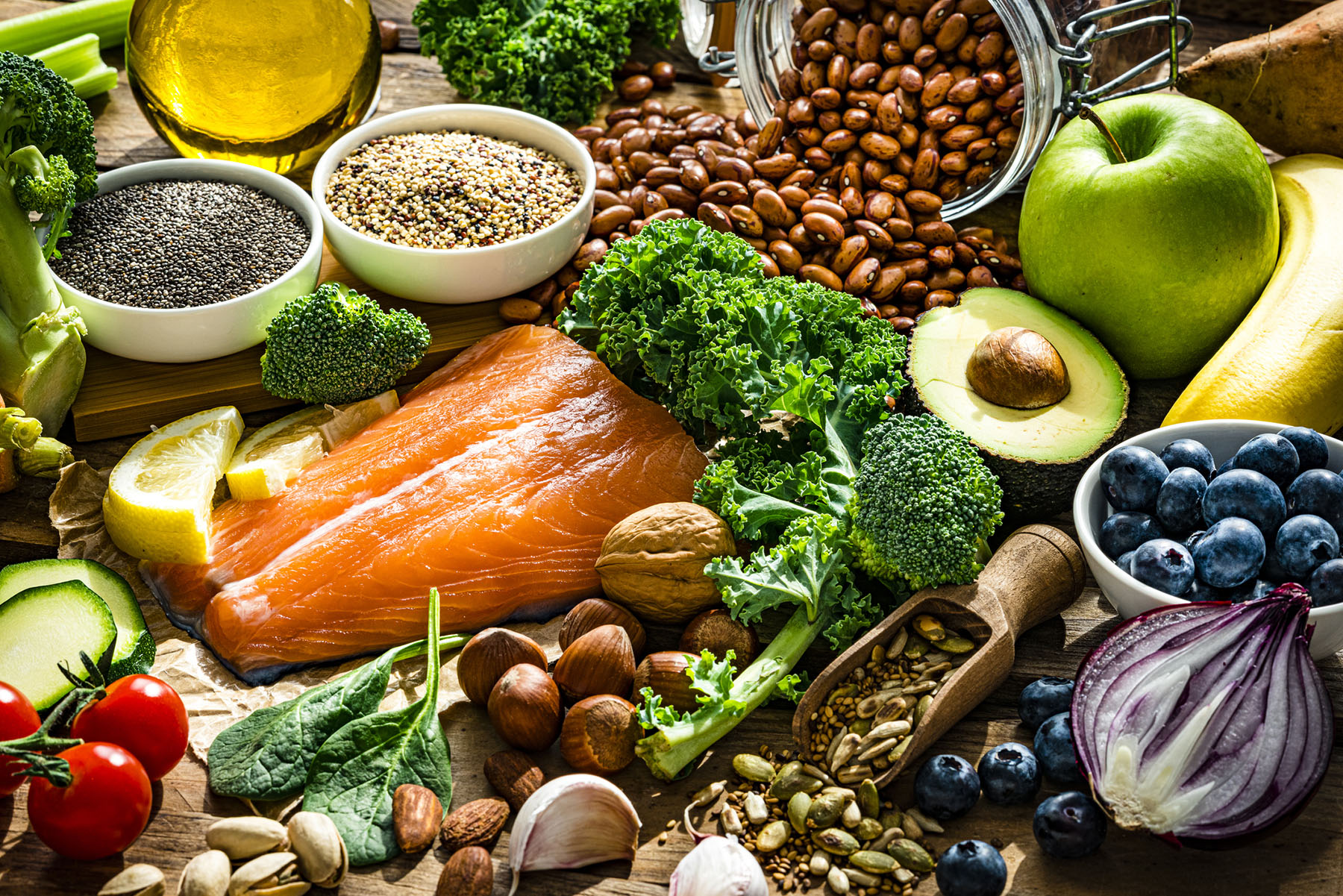Nutrition a Key Ingredient During Sarcoma Treatment

When facing a sarcoma diagnosis, nutrition becomes more than just a lifestyle choice. It’s a vital part of the healing journey.
Sarcoma is a rare and aggressive cancer that develops in bones and soft tissues like muscle, fat and blood vessels. Since some sarcomas start in or impact the skeletal system, preserving bone strength is critical.
Treatment is both physically and emotionally demanding. Chemotherapy, radiation and surgery can weaken bones, suppress appetite and impair nutrient absorption. For sarcoma patients, nutrition is central to treatment, recovery and strength.
“Whether preparing for treatment, managing side effects or recovering, the right foods strengthen bones, boost immunity and accelerate recovery,” says Brooke Crawford, M.D., division chief of orthopaedic oncology at Sylvester Comprehensive Cancer Center, part of UHealth – University of Miami Health System. “A coordinated care team ensures nutrition strengthens every step of the journey.”
Before treatment: Build a strong foundation

Starting treatment with a well-nourished body improves resilience, energy and recovery.
“A well-balanced diet builds reserves—better digestion, energy, focus and sleep,” says Dr. Crawford, associate professor of clinical orthopaedics at the Miller School of Medicine. “Patients who are healthier at diagnosis often recover faster and tolerate treatments better.”
Key nutrients to protect bones and build resilience for sarcoma patients include:
- Protein: Critical for muscle maintenance, immune support and healing. Best sources include chicken, turkey, fish, eggs, Greek yogurt, lean meats, beans, lentils, tofu, tempeh, nuts, seeds, soy milk, quinoa. Limit red meat to to 12 to 18 ounces per week and avoid processed meats.
- Supplements: Protein shakes and powders can help the cause.
- Calcium: Preserves bone density and is found in dairy, leafy greens (kale, collard greens), fortified, plant-based milks and canned sardines with bones.
- Vitamin D: Helps absorb calcium. It is found in fortified foods, salmon and tuna and often requires supplementation.
Federika Garcia, RDN, CNSC, CSO, clinical nutrition manager with oncology nutrition expertise at Sylvester, emphasizes the importance of prioritizing protein to build muscle mass and making smart food choices to stay strong and avoid treatment delays.
“Some patients think eating toast for breakfast and salad for lunch is healthy,” says Garcia. “Without enough protein, healing slows, muscles weaken and recovery suffers.”
She also stresses the importance of physical activity.
“Patients with more muscle mass tolerate treatment better and have fewer complications,” she adds.
During treatment: Nourish through the challenges
Treatment often causes nausea, fatigue and appetite loss. But the body still needs fuel. Nourishment preserves bone and muscle and supports immunity during this critical time.
“Even when eating is difficult, every bite counts,” says Dr. Crawford. “Food provides the elements needed to support our immune systems which are crucial in cancer treatment, musculoskeletal systems and even our brain function, impacting both outcome and outlook.”
When appetite is low, try small, nutrient-dense meals that are gentle on the stomach, such as:
- Smoothies with yogurt, fruit and protein powder
- Bone broth
- Oatmeal with almond butter
- Scrambled eggs with cheese or avocado
Hydration is equally important. Water, broths, fruits and electrolyte drinks help fight fatigue and support kidney function, especially during chemotherapy. Immune-boosting foods like berries, citrus fruits and leafy greens provide antioxidants and vitamins to help the body endure treatment.
After treatment: Rebuild and restore
Recovery isn’t just about surviving. It’s about rebuilding. Post-treatment fatigue and bone loss are common, making nutrition just as important.
“After treatment, we help patients regain strength and restore a healthy weight with anti-inflammatory foods, protein and hydration,” says Garcia.
Continue prioritizing:
- Calcium and vitamin D: To rebuild bones
- Whole grains, vegetables, fruits, healthy fats (e.g., avocados, nuts and seeds): To reduce inflammation
- Protein: To repair tissue and restore energy
Limit or avoid:
- Processed meats and red meats: They’re linked to inflammation and cancer.
- Sugary snacks and beverages: They promote inflammation and weight gain.
- Alcohol: Especially with certain medications.
- Raw or undercooked proteins: They’re risky when immunity is low.
Create a personalized nutrition plan
There’s no one-size-fits-all diet for sarcoma. Each patient’s plan must reflect their individual treatment, symptoms and goals.
“Sarcoma presents unique nutritional challenges,” says Garcia. “What’s effective for one patient may not work for another.”
She warns against restrictive fad diets and urges patients to pursue realistic, sustainable strategies.
“Work with your care team to build a plan that fits your life,” added Garcia. “Ongoing support from an oncology dietitian helps patients stay strong, complete treatment and heal faster.”
Every nourishing bite is a step toward healing. With the right support, nutrition becomes powerful medicine for the bones and the whole person.
Recipes
One-Bowl Oatmeal Cottage Cheese Bake
- 1 cup of rolled oats
- ¼-tsp. salt
- 1 tsp. baking powder
- 1 tbsp. chia seeds
- ¾-cup of cottage cheese (or substitute with Greek yogurt)
- 1 cup of milk
- 2 eggs
- ½-cup of blueberries or a mix of berries
- Optional: 1 to 2 tbsp. maple syrup or honey, cinnamon, vanilla, banana, mix of nuts, protein powder.
Mix all the dry ingredients in a bowl. Next, add the wet ingredients. Then transfer to an oven-safe casserole dish sprayed with cooking spray, mix well and bake in a preheated oven at 375°F for 25 to 30 minutes or until set. Cool, slice and refrigerate leftovers.
Overnight Chia Pudding
- ½-cup plain Greek yogurt
- ½-cup milk
- 2 tbsp. chia seeds
- ¼-cup soft fruit pureed or in chunks (bananas, mango, berries)
- Optional: vanilla, cinnamon, chopped nuts, protein powder. Add granola before serving.
Add all ingredients to a jar or container with a lid, mix well and refrigerate for at least four hours, allowing the chia seeds to thicken. Enjoy it cold or at room temperature.
Creamy Spinach and Egg Muffins
- 2 eggs
- ¼-cup plain Greek yogurt
- ½-cup cooked, chopped spinach or other chopped vegetables (fresh or frozen)
- ¼-cup shredded cheese (mozzarella)
- Salt, pepper, garlic powder or other spices
Preheat the oven to 375°F. Mix all ingredients in a bowl. Pour the mixture into a greased muffin tin or oven-safe container and bake for 15 to 20 minutes or until set.
Written by Debby Teich for Sylvester Comprehensive Cancer Center.
Tags: cancer, cancer and diet, cancer care in Miami, diet, dietary tips, Dr. Brooke Crawford, Nutrition, protein, Sylvester Comprehensive Cancer Center
